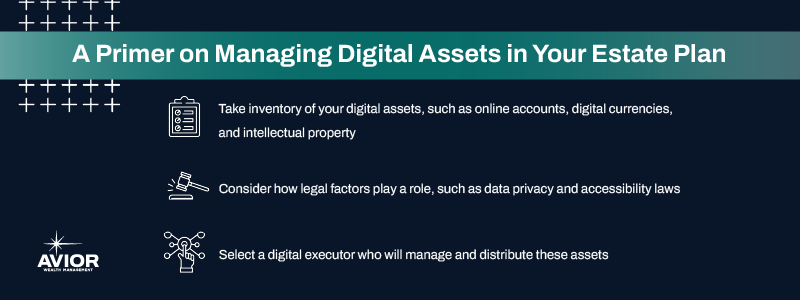A Primer on Managing Digital Assets in Your Estate Plan
In the digital world we live in, it’s extremely important to factor in your digital assets when planning how your estate will be distributed.

When you’re in the estate planning process, you start taking stock of all of your assets and debts, figuring out where your property will land once you’re no longer around. In today’s digital-everything landscape, you also need to carefully consider your digital assets beyond your physical property.
Digital assets are the electronic accounts and assets that you may easily overlook when assessing your estate. This guide walks through the common types of digital assets you may have and how to incorporate them into your estate plan.
Identifying your digital assets
Inventorying your digital assets will look different than your other assets, like real estate and vehicles. Make a list of all your online accounts, digital currencies, and online intellectual property. Even if you think a digital item doesn’t have monetary value, it’s still important to take inventory so you can create a plan for what happens to these assets after your passing.
Here are common examples of digital assets of note:
- Email accounts
- Photo and video files in the cloud
- Online banking accounts and apps
- Online investment accounts
- Online accounts for utilities, like cable and electricity
- Smartphone apps and memberships
- Social media accounts and apps
- Keys for cryptocurrency accounts
- Websites and domains
- Online accounts at stores and e-commerce sites
Go through your smartphone apps and frequently visited web pages to ensure you don’t miss anything. You may have many different accounts that will need attention so others can access them or you may decide to move files or add people you trust as admins.
Legal considerations for digital assets
You must be careful with managing and transferring digital assets, as there are several laws and legal concerns that apply. Many of these laws and regulations are still evolving as new technologies enter the landscape.
Something called the Revised Uniform Fiduciary Access to Digital Assets Act (RUFADAA) outlined different tiers of assets and privacy and protection guidelines for digital assets. This act requires that you assign permission to an executor who can access any accounts at your discretion once you’re gone, including email accounts.
Laws are in place to prevent unauthorized access to digital data and systems, and it can be a challenge to navigate what they mean for your assets and executor. It’s always important to be clear about who you’re authorizing to access your accounts and give them all the information they need for access.
Other laws surround data privacy to ensure online providers don’t share your sensitive information with anyone else without your approval. Websites or social platforms could lock your accounts unless you provide clear permission for someone else to access them. You never want your loved ones to have to end up in court just to access your digital information.
Laws about digital assets may vary by jurisdiction, so always talk to a legal expert who is familiar with your area and the local laws you need to follow.
How to incorporate digital assets into your estate plan
So, how do you effectively integrate your digital assets into your estate plan? Consider all elements of access and distribution of your assets, as well as what information you want to be deleted.
Make a list of each of your digital resources and any access information the executor will need, including your usernames, passwords, and security question answers where applicable. Don’t include this type of sensitive information in your will, though. Wills are made public documents after your death, so you don’t want anyone but the executor to have that access information.
Then, outline who will receive which digital assets. Be clear so your heirs don’t have any confusion about who receives what. It’s also a must to start deleting digital assets you no longer need, and then including instructions for further deletions that must be made upon your death.
Selecting an executor is a crucial step, discussed next.
Designating a digital executor
You may already have an executor for your estate plan who you have listed in your will. Consider whether this person is a good choice for your digital assets as well. If not, think about naming a separate digital executor.
The digital executor will be in charge of managing and executing all of your digital asset directives, including:
- Accessing your online accounts with your permission
- Consolidating digital assets if necessary
- Contacting heirs who will receive digital assets
- Distributing assets according to your wishes and instructions
- Communicating with providers
- Navigating and following laws surrounding digital information and privacy
Choose a digital executor who is digitally savvy and understands the nuances of these changing laws and systems. Talk to your designated individual about this unique component of estate planning before you set everything in stone.
Securing and updating digital asset information
Security is a major factor in ensuring your digital assets are protected and transferred properly. The more sensitive the information, such as financial information, the more security practices you need to implement.
Make sure your online accounts have strong passwords that aren’t easily guessed and have a mix of numbers, letters, and characters. Take advantage of multi-step authentication when sites offer it and provide this information to your digital executor.
Regularly update your information as your situation changes and always be sure to update your digital asset estate documents and instructions so your executor has everything current upon your passing.
Managing your digital assets with Avior
Remember that your holistic estate includes your digital assets, not just physical property. You need a carefully outlined plan to ensure your digital information and assets are secured and passed according to your wishes once you’re gone.
The team at Avior helps you create a comprehensive estate plan to address each category of asset you have, including digital. We help guide you through will creation and executor designation, and ensure you understand the laws that apply to you.
Talk to Avior today to get started with asset protection techniques in estate planning.
Disclaimer: Nothing contained herein should be construed as legal or tax advice. Avior and our Advisors will work with your attorney and/or tax professional to assist with your legal and tax strategies. Please consult your attorney or tax professional with specific legal and/or tax questions. Investment Management and Financial Planner are offered through Avior Wealth Management, LLC, an SEC-registered investment advisor. Past performance is not a guarantee of future results. Investments are subject to loss, including the loss of principal.
No Comments
Sorry, the comment form is closed at this time.




